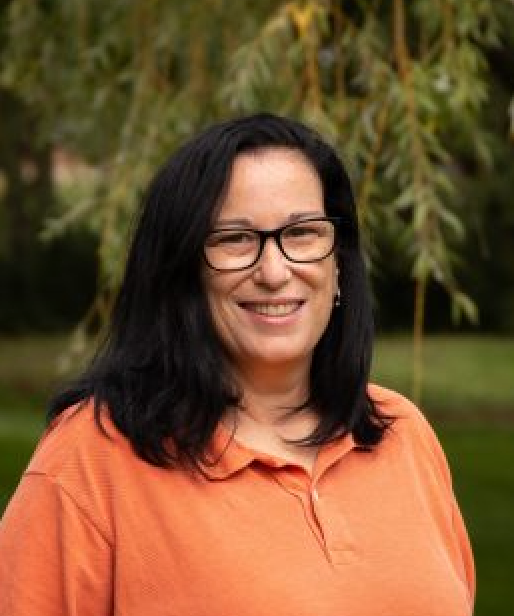
Nancy Williams is a fourth-year Peace and Conflict Studies major and is taking a minor in Philosophy. She studied at Waterloo in 1988 but moved out of the province and put her formal education on pause. Nancy describes the return to education as changing her life and after taking PACS 101 -Peace is Everybody’s Business, she knew it had to be her major. Since then, Nancy has taken full advantage of programs at the University of Waterloo that focus on community learning and engagement.
One of these involvements is with The Ripple Effect Education (TREE) where she works as an educator, going into classrooms and working with kids in Grades 1-6. In these 5-week programs, she works on peace-based education - teaching peace and conflict resolution in age-appropriate ways. This includes teaching how to deal with bullies, teaching empathy, and with older children, she discusses land acknowledgements, heritage, and identity.
It gives me hope for the future to know that children as young as 5 are being taught concepts like compassion, empathy, and mindfulness. Had I had that teaching when I was in school, I would have been a different person.
Nancy reflects on the importance of the program. “Conflict is a big part of life,” she says, “we start with teaching different conflict styles. We explain what conflict is and how we deal with it with tools and strategies.” This is work that relates to Nancy’s education in PACS, and to her work at Wisahkotewinowak Indigenous Garden Collective.
Nancy first found this work at Wisahkotewinowak through Beyond U, a program offered out of UWaterloo’s University College, St Jerome’s University College, which pairs students with a local non-government organization (NGO). She was paired with White Owl Native Ancestry and the Wisahkotewinowak garden, which is part of their outreach. She describes having an internship with the organization’s garden as “wining a lottery!”
She started her internship in April, 2022, planting rows of crops. She shares that the garden grows all organic food, and what is grown is given to families in the region. Part of the garden’s focus is land-based learning. Anybody can access the garden and help, and there are outreach programs that school classes come and attend as well, such as seeing the sugar bush and how the maple trees are tapped in the winter, according to Nancy.
Working at the Wisahkotewinowak garden has been healing and encouraging for Nancy. A large part of Metis belief is that there is a spirit in all living things and everything around us -in plants, rocks, and trees. Working in the garden is a way for Nancy to connect to the land while making an impact on her community. Peacebuilding and working with the land are also very intertwined.
I cannot separate the Indigenous perspective from peace-building practices. I worry that I am not doing as much as I can do and not being the best steward I can be of what I can be given. With being Metis, we believe there is a spirit in all living things and in everything. I conduct myself with an awareness that everything around me is alive and deserves respect.
Overall, Nancy expresses that she is forever grateful for returning to school. One of the courses that especially stood out to her was PACS 310 - Peace and the Environment, which she took with former PACS professor, Dr. Jennifer Ball. One of the assignments that resonated with her the most was finding a spot in nature and going there and learning the language of that spot. Nancy admits at first, she rolled her eyes at the idea, but over time connected with nature in a meaningful way, and found a calm feeling that she could not find elsewhere. “I realized land has trauma,” Nancy explains, “and we were able to comfort each other”. This is just one of many experiences that have impacted Nancy throughout her degree.
My experience with PACS has been literally life-changing. It opened me up to experiences I didn’t know existed. Had I not come back, I would not have known about the PACS program, or TREE, or the Beyond U internship. When I began PACS degree people would ask what I wanted to do, and I always said I wanted to work with indigenous children. I imagined I would have to go way up north to work with Indigenous children and make a difference, but now I have been able to do that with White Owl and I feel as though my dreams have come true by coming back to school.
Looking forward to after graduation, Nancy is excited to continue working with communities she belongs to and continue to work with Indigenous children.
Where I feel I can help the most is at a local level. The schools I visit and the work that I do with the land are about building the local community I am in. It can get overwhelming thinking about the need for peace and environmental change in the world. If you start with where you live, you can deal with the problems that you are facing currently and not get overwhelmed.
There is a belief that if you complete a Senbazuru (Japanese meaning 1,000 cranes) - which is made up of 1000 origami cranes, you can get your heart's desire. Nancy loves origami and has completed several Senbazuru but chooses to give them away to other people and let them have their wishes come true instead. This craft is a simple act done a thousand times, but this is a poetic way of understanding the work that Nancy does and the change that she is making - at a community level through a thousand simple acts which are possibly making her heart's desires come true.
Since this interview took place, Nancy has been chosen to be a part of a service-learning opportunity with SJU in Peru in spring 2023.